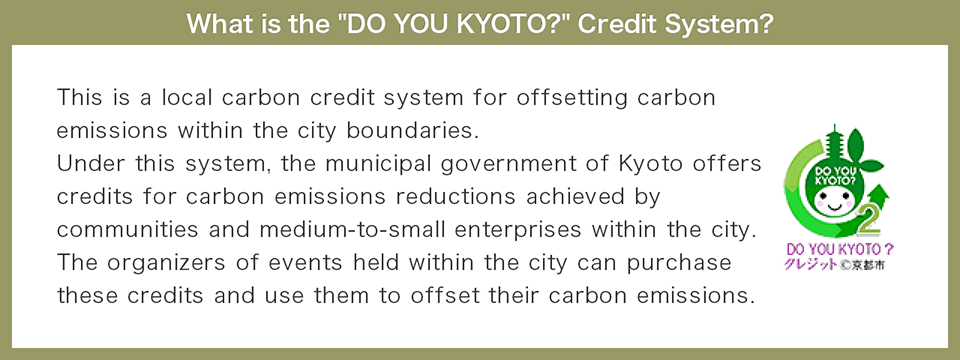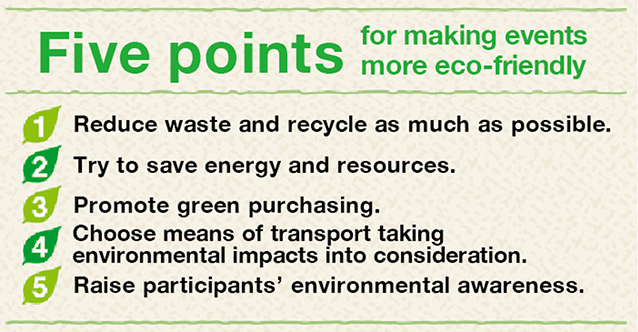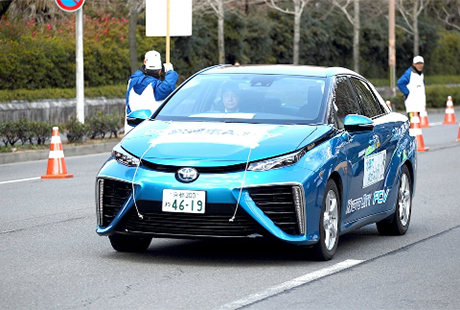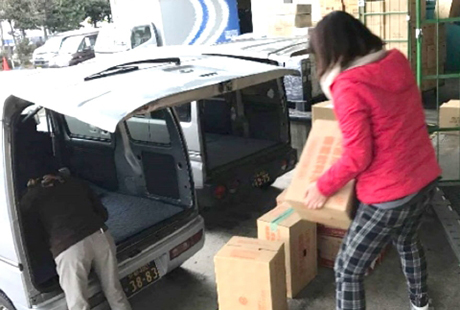Supplying water in "my cups or bottles"
Runners may fill their own water cups or bottles at all water stations.There will also be water stations exclusively for runners to top-up the cups or bottles that they have brought with them.

Do you know the phrase "DO YOU KYOTO?"
This is the message we are transmitting from Kyoto to the world. Meaning "Are you taking actions to save the environment?", it was created in the wake of the Kyoto Protocol (an international treaty adopted at COP3, the third session of the Conference of Parties to the UN Framework Convention on Climate Change which was held at the Kyoto International Conference Hall in 1997, effective from February 16, 2005).
The name of the city is now widely known as the birthplace of the Kyoto Protocol and is frequently associated with environmental matters. Now, the word "KYOTO" is being used worldwide to denote something more than the name of a city -- "doing something good for the environment."
The Kyoto Marathon, as a "Model event for the green city of Kyoto", implements a variety of environmentally friendly initiatives, continuing under the main concept of "DO YOU KYOTO? Marathon". At the same time we strive to make it a sustainable tournament with the spirit of "keeping the Earth and people healthy from Kyoto".

Runners may fill their own water cups or bottles at all water stations.There will also be water stations exclusively for runners to top-up the cups or bottles that they have brought with them.

Using the city's "DO YOU KYOTO? Credits," we will try to offset the carbon emissions inevitably caused by the event from such things as the use of electricity at the event sites or the combustion of waste. By doing so, we aim to realize a marathon event with, effectively, zero carbon emissions.
* Carbon offsetting is a method of compensating for emissions which are generated even after doing what we can do to reduce emissions in our daily living and economic activities, by investing in emissions reduction activities which will balance them.

Kyoto City officially recognizes and registers "Eco Events," which promote and implement all of the "five points for making events more eco-friendly." Ever since the first event, all Kyoto Marathon events have aimed at eco-friendly organizations and have been officially recognized as "Eco Events."


The city will designate the day of the event (February 18, Sunday) as "Car Free Day" and call for use of public transport instead of private cars.
* Under its landscape policy, the city of Kyoto has few multi-level crossings on streets, and many of its residents work within the city.

To stay warm before the race starts, we ask runners to bring or wear old sweaters, jackets, etc. that they no longer need. We will collect and reuse or recycle any of these garments that they may take off at the starting point or along the course. Additionally, we will collect and reuse or recycle unneeded official volunteer clothing after the event.

CO2-free hydrogen fuel cell MIRAI vehicles will join the motorcade.

Some 450 reusable garbage bins will be set up at marathon course.

To minimize food waste, we will donate any unused items at water/food stations to food banks*, and others.
* Organizations or campaigns that receive from businesses donations of any food that is to be thrown out, but still fit for consumption, and then donate such food to social welfare facilities.

Aiming to utilize recycled resources,champion's medals will be 100% made out of gold collected from recycled small electronic appliances.

At the start/finish areas along the course,volunteer/staff apparel(excluding caps) will be collected and those items of clothing that can be recycled will be cleaned and reused.
The event will minimize the use of paper, for example, by making finisher records searchable online instead of using prints.
"Runners, supporters, and cheerleaders - all playing an important part" has always been one of the objectives of the competition. However, we listed it as the main concept, because we want this competition to shine the spotlight on "everyone being the hero", where everyone involved in the Kyoto Marathon, including runners in the first place, but also Kyoto citizens, volunteers, sponsoring companies, and supporters along the route to can enjoy it more proactively than ever.